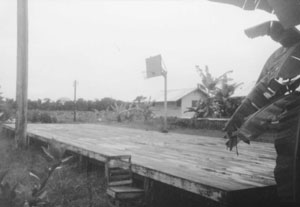
Let’s be real. All of you certainly know what next year is. A Significant Anniversary. You’re familiar with the routine, I’m sure. The phone will ring one day soon, and it will be the first in a legion of reporters, asking the same questions many of you have heard in 1983, and in 1988, and in 1993, and in 1998, and again in 2003. I’d also like to apologize in advance for any of the people in my industry who might treat you like a story and not a person. That’s wrong. Always has been. Always will be.
Because so many people are going to call, I’d like to explain why the story I’m doing is different than any other that’s been done.
We all know that there have a million words written about Jonestown. But there has never been a story written solely about the basketball team. I’d like to change that. I’d like to write a story about the men who played on the team, about the games and the days in between, about starting the team, about the importance of rebelling – even just a little bit – and about what the game has meant since leaving Guyana.
It’s a story about the importance and power of sports.
My name is Wright Thompson. I’m a senior writer for ESPN.com and ESPN The Magazine. I was born in Clarksdale, Mississippi. I’m putting together a story about the Jonestown basketball team, and I would like to talk to as many people who are familiar with the team – especially players and coaches – as possible.
Some of you might be familiar with a story that my colleague Jon Fish produced for ESPN TV about the basketball career of Rob Jones, the son of Jim Jones, Jr., who himself played on the Jonestown basketball team. Jon and I were in contact the entire time he worked on his piece. It was an excellent story, but for me, it serves as a point of departure to what I want to do. Instead of focusing on one player, mine will tell the stories of all the team members. It will examine who they were, what their role in Jonestown was, what they’ve done with their lives since, and what they took away with them, both as former members of Peoples Temple and as members of the basketball team. I plan to travel to Guyana sometime after the rainy season ends in January 2008. My piece will be an E-Ticket (the name we’ve given to our long form narrative non-fiction) and will run in November on ESPN.com.
I was drawn to this story after listening and reading as so many of you shared your experiences, about your desire that people not forget your friends and family members who did not make it home. Those words touched me and, since I work for a sports publication, I was drawn to this particular aspect of the story. It’s an important and under-told aspect.
My questions? Most will revolve around two broad themes: what it was like to play basketball there and what it’s been like since you left. I don’t want to cause anyone any pain or disrupt any lives. If you don’t talk about that part of your past to your family and friends, I can preserve your anonymity, if that makes you more comfortable sharing your story. I want this to be a positive experience for anyone who chooses to speak with me.
Over the next few months, I will be reaching out to those of you who were on the team. If any of you would like to ask me any questions about this story, or about anything else, please e-mail me at wrightthompson@gmail.com or call me at 816-260-0305.
If anyone who wasn’t on the team has memories or stories they’d like to share, please contact me as well. That would be incredibly helpful.
(Wright Thompson is a Senior Writer for ESPN.com/ESPN The Magazine.)